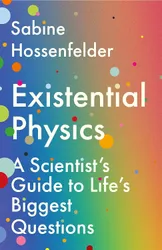This book aims to apply physics to the deep questions people have about the universe we live in and our existence within it. This includes things like the origin of the universe, consciousness, and whether or not we have “free will”.
At the beginning of the book, Hossenfelder issues a warning that the contents might affect your mental health and that if you’re happy with your current beliefs (or delusions, as she describes them) it might be better to stay away. Hossenfelder identifies herself as an agnostic at the start of this book and throughout the book she tries to be the voice of science fact, generally taking a hard scientific line on these questions, and wielding Occam’s Razor ruthlessly against unnecessary explanations. However, she is comfortable with beliefs being ascientific (being defined as things that science has nothing to say about), but not with them being unscientific (i.e. going against established scientific fact). In fact, at the end of the book, she repeats Stephen Jay Gould’s claim that religion and science are two “nonoverlapping magisteria”. I don’t agree with this, personally, because it seems to limit the areas that science is allowed to investigate. Of course, there may be things that science is never actually able to investigate for practical reasons, but I don’t think that means that they are in principle outside the purview of science.
Throughout the book there are some interviews with other scientists. Some of these scientists are open to looser interpretations of our scientific understanding, to allow more room for speculation or metaphysical beliefs. Hossenfelder tries to be charitable to their views in her transcripts, but she doesn’t present their arguments as being very coherent. It’s hard to tell if this is because the participants’ thinking was genuinely woolly and confused, or if we are missing some context or extra explanations that would have helped. So while these sections were interesting, they didn’t do much to test Hossenfelder’s views.
One of the things I found most troubling to think about is the question of free will. Here Hossenfelder takes a particularly hard-line stance against the idea of free will, repeating the mantra:
the future is determined by the past, except for occasional quantum events that we cannot influence.
What makes it troubling is that I can’t find any holes in this view! But perhaps I have no choice in the matter…
This book doesn’t dumb down the technical physics, and the explanations for some complex concepts can be a little hard to follow. As a result, it feels like parts of the book were written to debunk the arguments of her physics colleagues rather than being written for a lay audience. One of the scientists that comes in for some criticism is Max Tegmark, who wrote Our Mathematical Universe. There are other explanations which are really good though. I found the section on entropy, and how this leads to our perception of time, very well written and easy to understand (while still being quite mind-bending).
Despite the magnitude of the subject matter, the book has a lot of humour and is fun to read. Naturally, I don’t agree with everything Hossenfelder says, and I imagine most readers would feel the same. But I enjoyed this book and found it thought-provoking.
